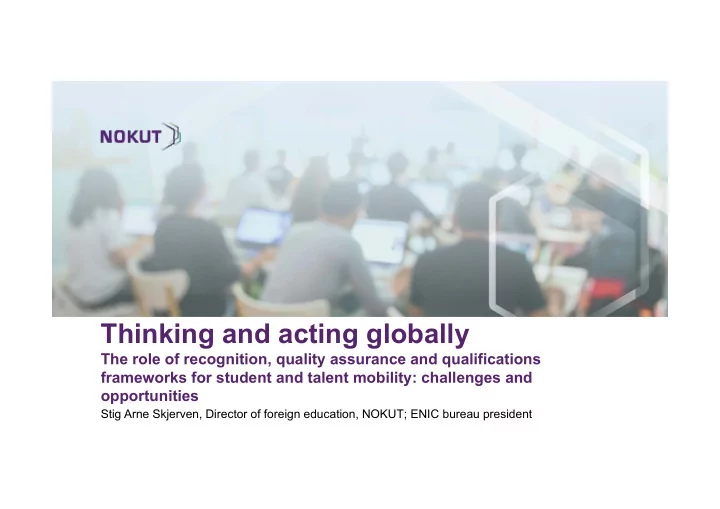

Thinking and acting globally The role of recognition, quality assurance and qualifications frameworks for student and talent mobility: challenges and opportunities Stig Arne Skjerven, Director of foreign education, NOKUT; ENIC bureau president
Outline of my speech • NOKUT: QA agency, recognition body and QF coordination point • The interplay between trust, quality assurance and recognition • The European model: Development of a higher education area • Trends, challenges and achievements in recognition related to QA, QF and quality
NOKUT = QA + recognition + QF • Mandate: safeguard public trust in education • Sole legal accreditor and QA agency • Legal decisions on recognition • ENIC-NARIC • Qualifications framework: NQF, EQF • Diploma supplement • EU Professional Qualifications Directive
Trust, QA and recognition • Recognition is an expression of trust in quality • Description of reality • Expression of a willingness to trust
Recognition as quality • Prerequisite for mobility and internationalization • Necessary to secure quality in admission of students • Social dimension of recognition: Fair system for qualifications • Reflects institution’s ability to understand the quality and QA processes of own qualifications • Recognition and QA are both part of the same infrastructure for expressing various manifestations of trust
European model: Developing a HE area • Lisbon Recognition Convention (LRC, 1997) • Common, legally binding principles for fair recognition of qualifications, periods of study, and prior learning • 2015 Bologna Process Implementation Report: Implementation of the LRC is still a challenge • Need to improve QA
ENIC-NARIC and EAR Manual • ENIC-NARIC: networks of information centres • Contribute significantly to the transparency of education systems and processes of QA that support HE • EAR Manual: Practical recommendations on assessment of qualifications • ENIC-NARIC charter: Expectation of bidirectional interaction with QA to establish common ecosystem of trust • Relationship with national quality assurance bodies
ENQA and ESG • Standards and guidelines for quality assurance in the European Higher Education Area (ESG) • European Association for Quality Assurance in Higher Education (ENQA) • Article 1.4: Fair recognition of higher education qualifications, periods of study and prior learning, including the recognition of non-formal and informal learning, are essential components for ensuring the students’ progress in their studies, while promoting mobility. Appropriate recognition procedures rely on • institutional practice for recognition being in line with the principles of the Lisbon Recognition Convention; • cooperation with other institutions, quality assurance agencies and the national ENIC/NARIC centre with a view to ensuring coherent recognition across the country.
Bologna Process: European HE Area (EHEA) • European Credit Transfer and Accumulation System (ECTS): good systems of QA important for legitimacy • Qualifications Framework for Higher Education (QF-EHEA): dual purpose as information and regulatory instrument • QF-EHEA European Qualifications Framework of Lifelong Learning (EQF) • European model: processes institutionalizing trust through quality
Trends, challenges and achievements • Bologna 2018: Renewed focus of core commitments that link QA, QF and recognition • three-cycle system in HE • compliance with LRC • QA in compliance with ESG • “Quality assurance is key in developing mutual trust as well as increasing mobility and fair recognition of qualifications and study periods throughout the EHEA.”
Automatic recognition • Bologna Process communiqué 2012, 2015: Higher education qualifications should be automatically recognized across the EHEA by 2020 • EU Member States Decision on the Automatic Mutual Recognition of Diplomas and Learning Periods Abroad 2018: • No separate recognition procedures to access studies in another EU country • Learning periods abroad automatically recognized as part of the learner’s education without loss of time. • Automatic recognition ≠ automated recognition
Digitization of recognition • Technological developments can reduce barriers for academic mobility and facilitate recognition • Verified, trustworthy information about a qualification: databases/websites • Verify the educational qualifications of applicants: trusted data depositories, diploma registries • Standardisation of data on the students and their academic attainments enable automation • EMREX project and ELMO standard for digital student data
UNESCO Global recognition convention • Right to assessment of qualifications outside home region • Recognition must be given unless proof of substantial difference between the foreign qualification and own qualifications • Procedures for the recognition of qualifications for individuals with insufficient or unverifiable documentation, including refugees • Requires transparency instruments for building trust, including “robust and ethical” QA
Refugees and forced migrants • Recognition of qualifications is one of the main education challenges for migrants • Important part of the social dimension of education, ensuring a just system of qualifications • Today’s practices are in large inadequate – clearly documented in the last Global Education Monitoring Report (UNESCO) • European Qualifications Passport for Refugees (EQPR) by Council of Europe – methodology developed by NOKUT • Qualifications Passport endorsed in the Brussels Communique, Dec 2018 • Possible global scheme based on collective action, SDG4 and upcoming global recognition convention
Conclusion • QA and recognition processes are mutually dependent factors in building national and international ecosystems of trust in education • Collaborative efforts create trust • Responsible recognition practices in light of QA: • Standards and procedures for QA of academic recognition • Policy reforms to establish common, fair, non-discriminatory transparent criteria for recognition • Structured information tools and contact points • Cooperation platforms between countries • Cooperation platforms for QA and recognition bodies
Thank you for your attention!
Recommend
More recommend